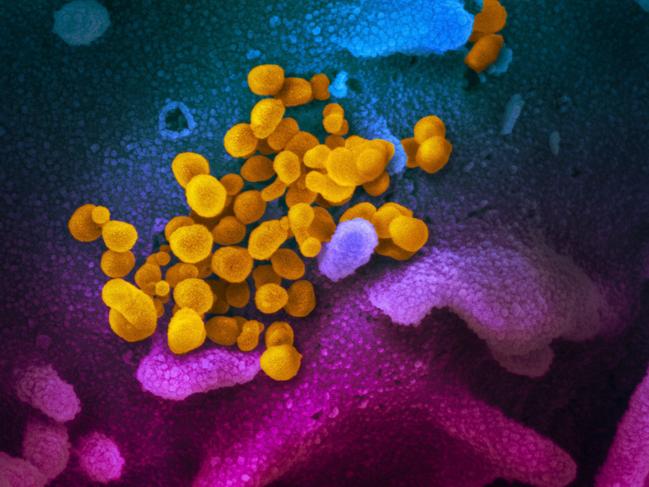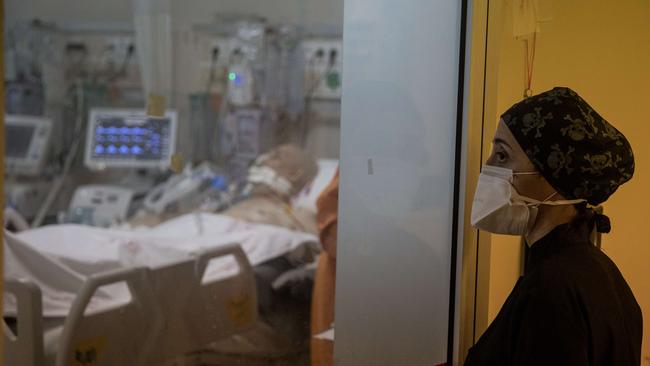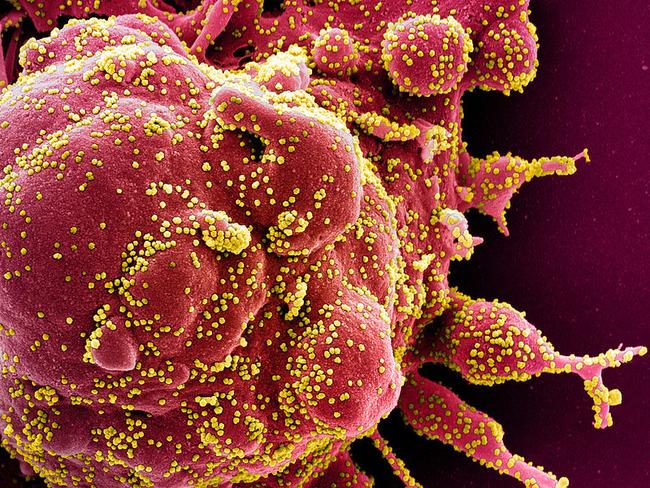COVID-19 infection: How it affects the human body, and can take up to a year to recover
Not all patients experience a flu-like illness when hit with COVID-19, with some experiencing paralysis and others left with brain problems and organ failure in severe cases.
Coronavirus
Don't miss out on the headlines from Coronavirus. Followed categories will be added to My News.
- ‘Very upset’: COVID-19 survivors, workers don’t need this
- COVID-19 plasma treatment begins development
COVID-19 has left some patients paralysed, others with brain problems and organ failure and recovery from the illness can take months or even as long as a year.
Patients in Australia who survive the trauma of being placed on a ventilator to help them breathe have become so deconditioned they require an extensive stay of up to six weeks in hospital, president of the Royal Australasian College of Physicians Professor John Wilson told News Corp.
“The virus can be active in the body for as long as six weeks and patients face a prolonged stay in hospital outside the intensive care unit and their kidneys and heart can be damaged,” he said.
The damage to a patient’s lungs can be so severe they may still require oxygen even after the ventilator is removed and extensive physiotherapy to help them breathe.
Prof. Wilson said the lungs can be so damaged by inflammation they become stiff, blocked by fluid and scar tissue making breathing hard for months.

John Hopkins University lung expert Panagis Galiatsatos warns “it can take three months to a year or more for a person’s lung function to return to pre-COVID-19 levels.”
The patient’s muscle tone depletes because they are bed bound and they often have to be taught how to walk again.
They are malnourished and disoriented and can develop psychological problems as a result of the medicines used to sedate them while they undergo ventilation, Prof. Wilson said.
The damage COVID-19 causes to the lungs starves the other major organs of oxygen and patients are at risk of multi system failure which becomes evident four to five days after they start on the ventilator.
At this time doctors and nurses discuss with the family withdrawing the ventilation and allowing the patient to pass away, Prof. Wilson said.

A little known complication of coronavirus is a condition called Guillaine Barre Syndrome which can leave a patient paralysed.
The immune system responds to the infection by mistakenly attacking nerve cells, resulting in muscle weakness and eventually paralysis.
Paul Skegg, a 42 year old radiographer from Kent, in the United Kingdom, developed the syndrome and recovered after being treated with experimental plasma treatment using the blood of people who had recovered from the virus.
Doctors in Italy reported on five COVID-19 patients they treated who developed the syndrome.
Prof. Wilson said the condition was not unique to COVID-19 and could also occur after infection with other viruses. He was not aware of it happening in Australia.
Chinese researchers reported in the Journal of the American Medical Association that among 214 patients with the virus, neurological symptoms were seen in 36.4 per cent and were more common in patients with severe infection (45.5 per cent).
MORE NEWS
Billion dollar plan to make more medicines in Australia
World praise for Australia’s COVIDSafe app
Aussie hospitals run out of critical COVID-19 medicines
Aussie troops volunteer as COVID-19 vaccine ‘guinea pigs’

There has been a spate of other concerning health problems associated with COVID-19. Doctors in the US and the UK have reported hundreds of cases of children suffering inflammatory shock syndrome that affects multiple organs.
Strokes and blood clots in healthy young people with otherwise mild COVID-19 symptoms have also been noted with alarm by doctors.
A recent German study published in the Annals of Internal Medicine reported more than half (58 per cent) of COVID-19 patients that had an autopsy were found to have blood clots that were not suspected before their death.
Between 14 and 30 per cent of intensive-care patients in New York and Wuhan, China reportedly lost kidney function and required dialysis.
“We have not yet fully identified how coronavirus affects the brain, the nervous system and its cardiac side effects,” Professor Wilson said.
Originally published as COVID-19 infection: How it affects the human body, and can take up to a year to recover


